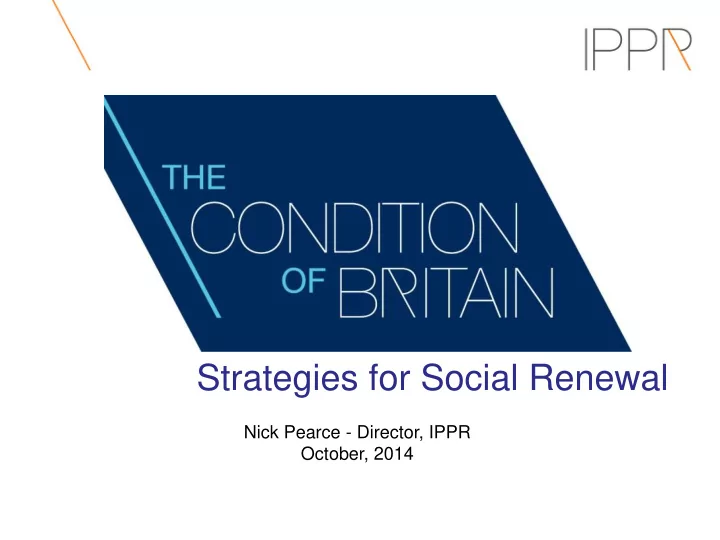

Strategies for Social Renewal Nick Pearce - Director, IPPR October, 2014
Context • Fiscal constraint : in an era of austerity, governments can’t spend their way to a better Britain. • Britain isn’t broken: crime and drug use are falling, people are healthier and better educated than ever before • Talent: Britain is full of resilient, creative people, but we must create a more equal society
Our goal: Equality of social relations • Equality is not just about income and wealth • Social equality is equally important – how we relate to each other as free and equal citizens. • This can’t be handed down from above , but depends on the active democratic involvement of people themselves. • This further requires that unjust hierarchies of power, esteem and standing are progressively overcome
The Three Pillars of a Stronger Society Social policy under both the Coalition and the previous Labour government have been too top-down, with an over- reliance on: i) The power of markets ii) The centralised state …to solve major and complex social problems We offer a critique of these dominant models and an alternative vision of a stronger more equal society via our Three Pillars…
Pillar 1 – Spreading Power and Responsibility While central government will always have a vital role, it must hand more power to cities and counties, and to the users of services. Why? • jobs and prosperity spread across the country, not just at centre • Innovation and collaboration, not standardisation and fragmentation • Local responsibility, not dependency on the centre
Pillar 2 – Fostering contribution and reciprocity We should rebuild reciprocity and a sense of shared endeavour, and the contributory principle in our welfare state. Why? • To mobilise all our resources, not settle for dependency or exclusion • For a resilient social security system, not residualisation or gradual decline
Pillar 3 – Strengthening Shared Institutions A good society depends on shared institutions like the NHS, children’s centres or neighbourhood networks for older people. Why? • Social reforms embodied in institutions are durable • End dependency for good, not a series of short-term fixes • Encourage popular support for collective social action, not frustration and distrust
What policy recommendations flow from these guiding principles?
Early Years PROBLEM : As female employment has grown, demand for childcare has risen, but childcare is expensive (especially in London) and quality is patchy. We propose: • A Nordic-style affordable, high quality system of universal childcare • 15 hours of free nursery care for 2-4 year olds for 48 weeks a year.
Young People PROBLEM : Young people are worried about their future, half a million are NEET and the school to work transition is limited for those who don’t go to university. We propose: • A youth allowance for 18-21 year olds • A ‘work guarantee’ after 6 months of unemployment • An expansion of apprenticeships and training
Working-Age Welfare PROBLEM : 78% of the public think the current system doesn’t reward contribution, benefits don’t protect enough against major risks, and contribution is not recognised. We propose: • A democratically governed national insurance fund for contributory benefits, separate to those for social assistance • Better ways of getting people back into work, run at the local level
Housing Currently 95% of government spending on housing goes on housing benefit with just 5% invested in bricks and mortar Within 5 years, the housing benefit bill will rise to over £25bn. After a 19.1% year-on-year jump, the average London home now costs £515k
Housing PROBLEM : Home ownership is increasingly out of reach, renting is often costly and insecure making it hard for families to put down roots, and we simply don’t build enough homes. We propose: • Allow towns and cities to expand • Shake up the land market • Give local authorities more freedom to borrow and build • Over time, shift the power over housing benefit to the local level
Crime and Exclusion PROBLEM : People feeling unsafe undermines the bonds upon which a strong society depends. Despite the fall in crime, 1 in 10 people still say their local area has levels of anti-social behaviour that are too high. We propose: • Extend restorative justice which gives a voice to victims • Establish neighbourhood justice panels involving local residents for low-harm offences • Extend the successful youth justice board and YOT’s to 18 -20s to keep more people out of custody and rehabilitated in the community
Older People PROBLEM : Britain’s ageing society offers us a great resource in the time and experience of older people, but social care services are underfunded and failing, and 1 in 10 people report they often feel lonely. We propose: • Development of neighbourhood networks of community groups that support older people • More care co-ordinators to put together care packages for people • 5 year integrated NHS and social care budgets
Where’s the £££? CHILDCARE: a universal system will cost over £2.5bn. To pay for this we suggest scrapping the marriage tax allowance, restricting tax-free pension lump sums to £36k and freezing child benefit for school age children in the next parliament. OLDER PEOPLE : The winter fuel payment should be means tested, and savings put into care services for those with moderate means. All other proposals are costed within the report.
Strategies for Social Renewal This presentation lists some highlights from the report, In total we make 28 practical, costed policy recommendations that seek to spread power, foster contribution and strengthen shared institutions in order to build a more equal society. Read it here: http://www.ippr.org/publications/the-condition-of-britai n-strategies-for-social-renewal
Recommend
More recommend